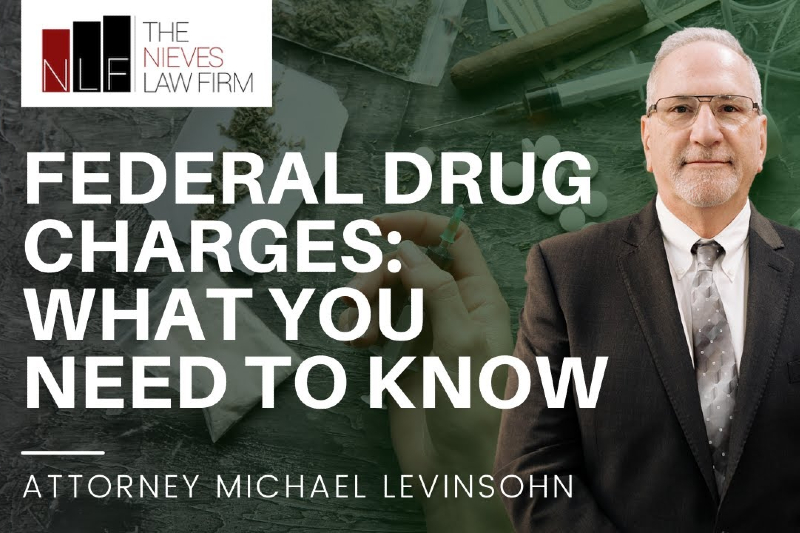How State-Level Drug Crimes Turn into Federal Drug Charges in California

What Triggers Federal Prosecution in State Drug Offenses
Facing federal drug charges in California can transform your life in ways you never imagined. Unlike state charges, federal drug prosecutions come with harsher penalties, stricter sentencing guidelines, and life-altering consequences that extend far beyond prison walls.
At The Nieves Law Firm, we understand what’s at stake when you’re up against the federal justice system. Let’s break down what you need to know about federal drug charges in California and why immediate legal representation is crucial.
When Do Drug Cases Become Federal Matters?
Not all drug offenses end up in federal court. Typically, cases escalate to federal prosecution when certain elements are present:
Interstate Activity
- Transporting controlled substances across state lines
- Using interstate communication methods to facilitate drug transactions
- Operating drug networks that span multiple states
Large-Scale Operations
- Manufacturing operations producing significant quantities
- Distribution networks handling substantial amounts of controlled substances
- Wholesale drug trafficking versus street-level dealing
Special Circumstances
- Importation of drugs from outside the United States
- Violations of the RICO Act (Racketeer Influenced and Corrupt Organizations)
- Cases involving federal property or agencies
Serious Violence or Weapons
- Drug offenses involving firearms
- Violent crimes committed in connection with drug trafficking
Federal authorities tend to focus their resources on dismantling larger operations rather than pursuing individual users. The DEA, FBI, and other federal agencies target what they consider the most serious drug offenders.
Federal Drug Charges: Common Offenses
Federal drug charges encompass a wide range of offenses, including:
- Possession with Intent to Distribute: Having controlled substances in quantities that suggest sales rather than personal use
- Drug Trafficking: Moving, transporting, importing, or selling controlled substances
- Drug Manufacturing: Producing illegal drugs or maintaining places for drug production
- Conspiracy: Agreeing with others to commit drug offenses, even without completing the crime
- Continuing Criminal Enterprise: Leading an organization that commits a series of federal drug crimes
Federal Sentencing Guidelines: Why They Matter
Federal drug cases follow the Federal Sentencing Guidelines, which calculate punishment ranges based on:
Drug Type and Quantity
The substance involved and its amount dramatically impact sentencing—penalties for trafficking 5 kilograms of cocaine differ significantly from those for 5 grams.
Criminal History
Prior convictions increase the guideline range substantially, with repeat offenders facing much harsher sentences.
Role in the Offense
Leadership positions draw more severe penalties than minor participants.
Mandatory Minimum Sentences
Many federal drug offenses carry mandatory minimum sentences that judges cannot go below without specific exceptions:
- 5-year mandatory minimum for:
- 100 grams or more of heroin
- 500 grams or more of cocaine
- 28 grams or more of crack cocaine
- 100 kilograms or more of marijuana
- 10-year mandatory minimum for:
- 1 kilogram or more of heroin
- 5 kilograms or more of cocaine
- 280 grams or more of crack cocaine
- 1,000 kilograms or more of marijuana
Potential Defense Strategies
While federal charges are serious, effective defense strategies exist:
Constitutional Challenges
- Illegal search and seizure violations
- Miranda rights violations
- Entrapment by law enforcement
Factual Defenses
- Challenging evidence testing and handling procedures
- Disputing actual versus perceived drug quantities
- Questioning witness credibility
Sentencing Reductions
- “Safety valve” provisions for first-time, non-violent offenders
- Substantial assistance to authorities
- Minor role adjustments for minimal participants
The “Minor Role” Adjustment: A Critical Defense Tool
The minor role reduction can significantly lower federal sentences for defendants who played a limited part in the criminal activity. This adjustment applies to:
- Couriers or “mules” transporting drugs for others
- Lookouts during transactions
- People coerced or manipulated into participation
- Those with minimal knowledge about the operation
Successfully arguing for minor role status requires detailed evidence and skilled legal advocacy—another reason why experienced federal defense representation matters.
Beyond Prison: Collateral Consequences of Federal Drug Convictions
The penalties for federal drug convictions extend far beyond prison time:
Civil Penalties
- Asset forfeiture (losing money, property, and possessions)
- Civil tax assessments
- Significant monetary fines
Long-Term Consequences
- Loss of voting rights
- Ineligibility for federal benefits including student loans, housing assistance, and food stamps
- Difficulty obtaining professional licenses
- Barriers to employment
Immigration Consequences
- Deportation for non-citizens
- Permanent inadmissibility to the United States
- Denial of naturalization
These additional penalties often follow convicted individuals for life, creating barriers to reintegration long after serving their sentence.
Federal vs. State Drug Charges: Key Differences
Understanding how federal charges differ from state charges helps clarify the stakes:
| Aspect | Federal Drug Cases | California State Drug Cases |
| Prosecution Resources | Extensive federal resources and agencies | Limited local resources |
| Bail Considerations | Detention more common | Release on bail more accessible |
| Sentencing Severity | Typically longer sentences | Often shorter sentences |
| Probation Terms | Stricter federal supervision | More flexible state supervision |
| Prison Placement | Federal prison system, potentially far from home | State prisons typically within California |
| Early Release | Limited to 15% good time credit | More early release options |
Why You Need a Federal Drug Defense Attorney
Federal drug cases move quickly, with procedures and practices distinct from state courts. Without proper representation, defendants often face the full weight of the federal justice system unprepared.
An experienced federal drug defense attorney provides:
- Knowledge of federal court procedures and customs
- Ability to challenge evidence and constitutional violations
- Experience negotiating with federal prosecutors
- Skill in arguing for sentencing reductions
- Understanding of collateral consequences and how to minimize them
The Nieves Law Firm Approach to Federal Drug Defense
At The Nieves Law Firm, we bring powerful advocacy to federal drug cases. Our approach includes:
- Immediate case evaluation and strategy development
- Thorough investigation of evidence and potential violations
- Proactive negotiation with federal prosecutors when beneficial
- Preparation for trial when necessary
- Detailed sentencing advocacy focused on mitigating factors
We understand federal drug prosecutions from multiple angles, allowing us to identify weaknesses in the government’s case and leverage them to your advantage.
Take Action Now: Your Freedom Depends On It
If you’re facing federal drug charges in California, time is critical. Evidence needs preservation, witnesses need interviewing, and defense strategies require immediate development.
Contact The Nieves Law Firm today for a consultation about your federal drug case. With what’s at stake—your freedom, future, and family—you can’t afford to wait.



